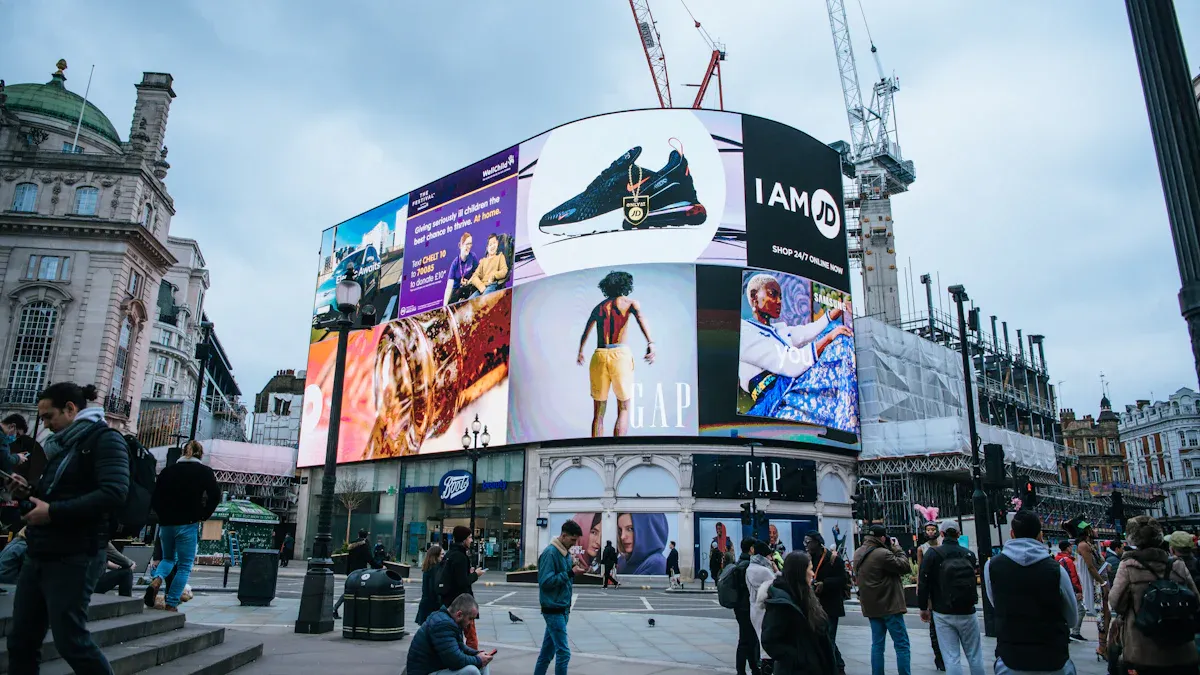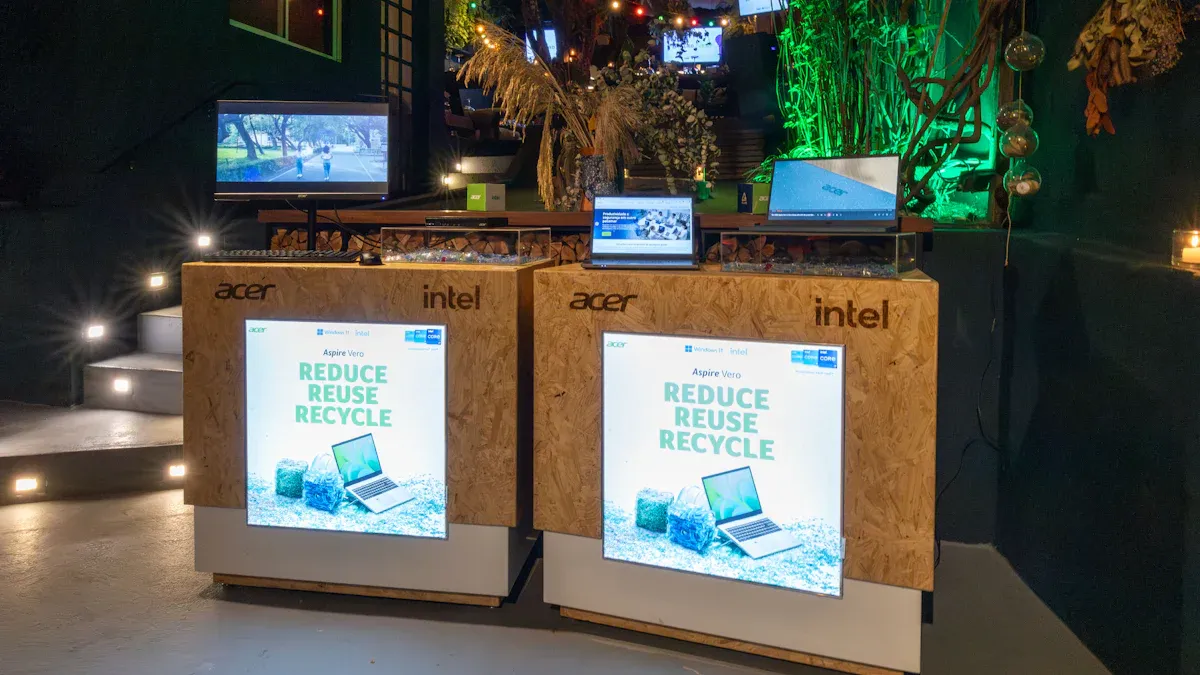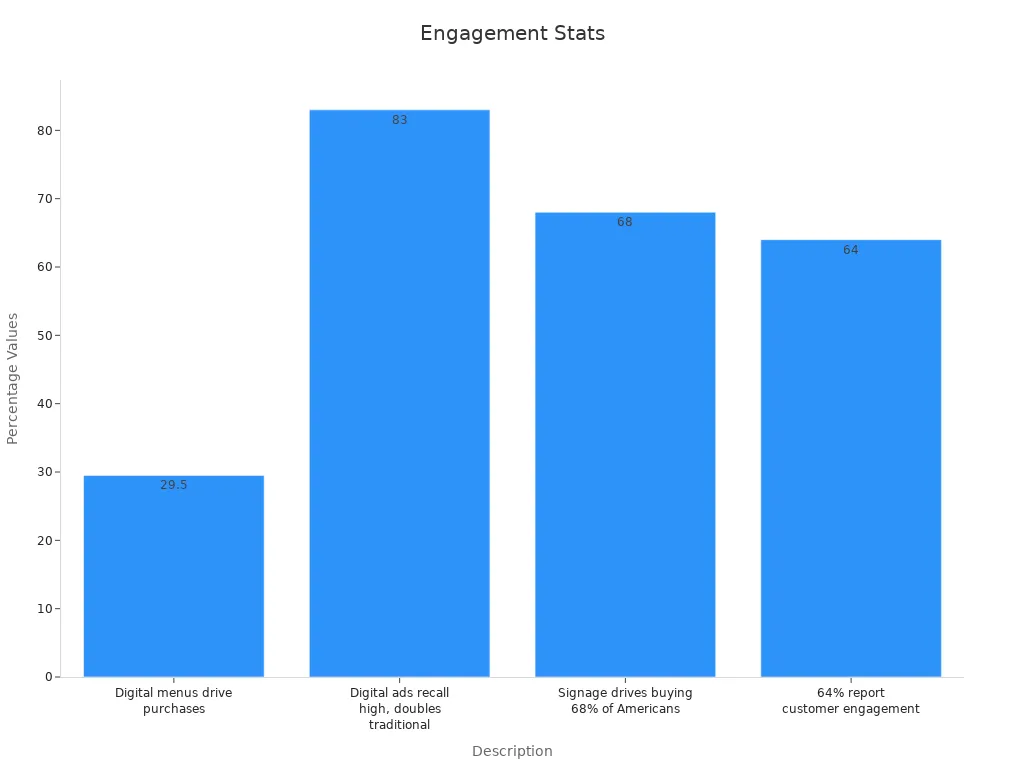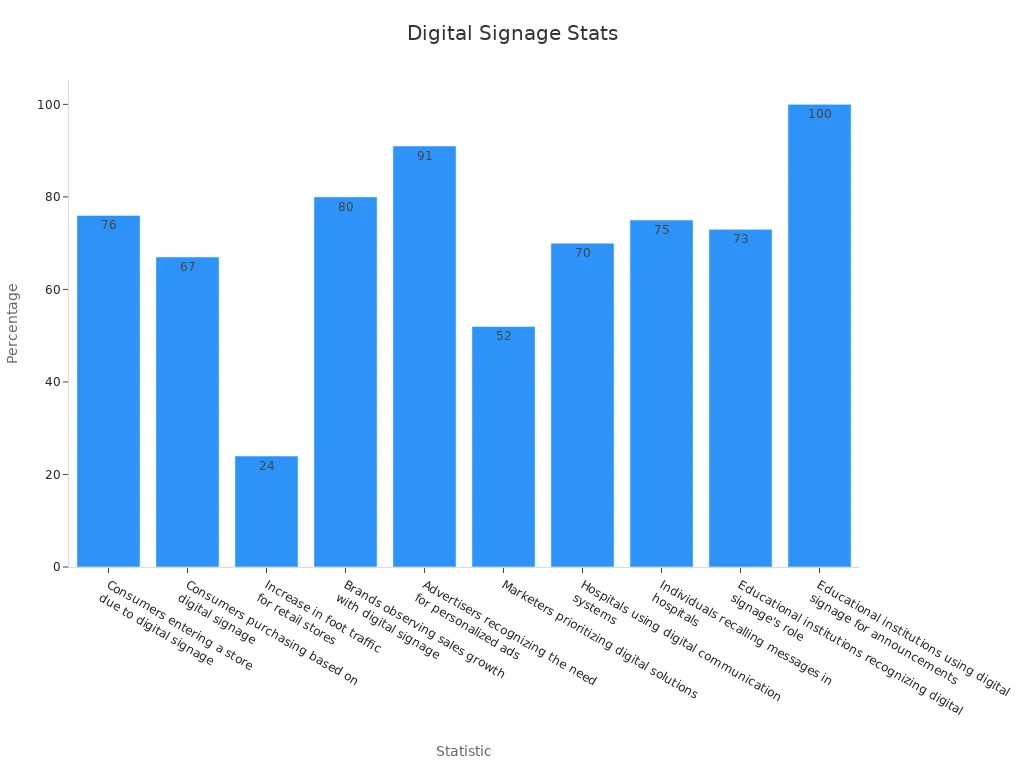Digital Signage Display Technology and its impact on communication

Digital signage display technology has transformed the way we share information today. These modern screens replace still images with moving digital displays, helping to convey eye-catching and focused messages to audiences. Businesses utilizing this digital signage display technology have experienced a 33% increase in sales, demonstrating its effectiveness in influencing buyers.
You can easily change messages to cater to different groups of people. Approximately 68% of shoppers report that digital signage display technology impacts their purchasing decisions. Additionally, 80% of individuals enter stores after seeing a digital sign outside. These screens can quickly update messages and adjust based on the viewers, ensuring that digital signage display technology delivers the right message to the right people at the right time.
Key Takeaways
Digital signs can increase sales by about 33%, helping businesses grow.
Touchscreen displays grab attention better, making people remember and buy more.
Taking care of digital signs keeps them working 99.9% of the time.
Live updates let businesses share quick info, improving customer happiness.
Digital signs help share messages clearly, reaching many different people.
Key Components of Digital Signage Display Technology

Digital signage uses hardware, software, and connectivity to work well. These parts help the system run smoothly and show interesting content to viewers.
Hardware Basics
The hardware is the main part of digital signage. It includes screens, media players, and mounts. Clear displays like LED or 4K screens make the content look sharp and exciting. Buying good screens keeps your system ready for future updates.
Media players are also important. Simple ones play 1080p videos, while advanced ones handle 4K videos and great sound. Wireless media players stream content from the cloud, making things easier and needing less equipment.
Reliable hardware is very important. Keeping the system running 99.9% of the time and having less than 0.1% downtime ensures it works well. Regular checks every month or quarter stop problems and keep the system dependable.
Tip: Pick hardware with strong internet, good security, and enough speed for high-quality content.
Metric | Benchmark | Notes |
|---|---|---|
System Uptime Percentage | 99.9% | Aim for reliable digital signage operations. |
Downtime Incidents | <0.1% | Fewer disruptions keep viewers interested. |
Maintenance Frequency | Monthly/Quarterly | Regular checks avoid system issues. |
Software for Managing Content
The software is like the brain of digital signage. It helps you make, plan, and change content from anywhere. Easy-to-use platforms let you manage your signage without needing special skills.
Advanced software gives real-time data about viewer interest and content success. This helps you adjust your messages for different groups, making them more effective. Automatic updates save time, cutting maintenance by 67%.
Note: Good software works well with your hardware and connectivity, creating a smooth system.
Connectivity and Working Together
Connectivity connects everything in digital signage. It lets you manage screens remotely, update them fast, and show ads to specific people. Strong connectivity means you can control your system from anywhere.
Tools that analyze data show how viewers react to your content. This helps you improve your signage and make smarter choices. Reliable connectivity reduces downtime, saving money and keeping viewers engaged.
Good connectivity also supports cloud-based features. Wireless media players stream videos from the cloud, keeping your signage fresh and interesting.
Tip: Choose connectivity options with remote control and analytics for better results.
Types of Digital Signage Solutions
Interactive Displays
Interactive screens change how people use digital signage. These displays let users touch and interact with the content. This makes the experience feel personal and fun. For example, you might see a touchscreen menu at a restaurant or a kiosk in a mall. Interactive screens grab attention better than regular ones. They get four times more views and have an 83% recall rate. This means people notice and remember the content, helping brands grow.
Interactive screens also affect buying choices. For instance:
29.5% of people buy items because of digital menus.
64% of users say interactive screens improve customer engagement.
These displays work best in places like stores, hotels, and schools where custom experiences are important.

Outdoor Digital Signage
Outdoor screens are strong and eco-friendly. They are built to handle bad weather and often have IP56 or higher ratings. These screens last a long time, between 70,000 and 100,000 hours. LED technology makes them use less energy, saving up to 30% on power compared to older screens.
Outdoor screens also help the environment. They replace paper ads, which saves trees and reduces waste. These screens are great for places like bus stops, stadiums, and public areas where durability matters.
Feature | Details |
|---|---|
Lifespan | Outdoor screens last 70,000 - 100,000 hours. |
Energy Savings | LED screens use 30% less power than older models. |
Less Paper Use | Stops deforestation by removing paper ads. |
Weatherproof Design | IP56 or higher ratings protect against tough weather. |
Video Walls
Video walls use many screens to create amazing visuals. They show ultra-clear (UHD) content, making them perfect for places like airports or events. These walls are great for showing live updates, keeping viewers informed.
Things like screen size, pixel clarity, and viewing distance make video walls effective. They fit well in different industries, making them a flexible choice for digital signage.
Feature | Description |
|---|---|
Ultra-Clear Content | Video walls combine screens to show UHD visuals. |
Live Updates | Perfect for places needing constant information, like airports or events. |
Wayfinding Signage
Wayfinding signage helps people find their way in big places. These digital tools guide you in airports, malls, and hospitals. They use touch maps, arrows, and live updates to make it easy.
These systems save time and prevent confusion. You can quickly locate your destination without asking anyone. They also show live updates about routes, traffic, and nearby spots. This is very helpful in busy areas like airports. For example, if a gate changes, the sign updates right away to guide you.
Tip: Choose wayfinding signage with many languages. It helps more people and improves their experience.
Feature | Benefit |
|---|---|
Real-time information | Gives updates on routes, traffic, and nearby places for easier navigation. |
Time-saving | Helps avoid frustration in crowded places like malls or airports. |
Multilingual support | Makes it easier for people who speak different languages. |
Interactive wayfinding signs also improve safety. They show emergency exits during dangerous situations. These systems adjust to changes, giving you the best information. For example, during an emergency, they highlight safe ways to leave.
Digital wayfinding signs work well with other tech. They can link to apps or give QR codes for more details. This makes them great for modern navigation. Whether you're in a new city or a big campus, these signs make traveling easier and more fun.
Note: Touch maps and flexible content improve the experience, making wayfinding signage essential for large spaces.
Applications of Digital Signage Across Industries

Retail Communication
Digital signage has changed how stores connect with shoppers. It shows moving content that grabs attention and encourages action. Retail Media Networks grew 53% last year. Top stores saw 2.8 times more sales from in-store ads. Using digital signage can boost sales by 24% to 38% for certain products.
These screens also make shopping better. They can show product details, suggest items, or share deals. Interactive screens help customers find what they need easily. This makes shopping more fun and satisfying. Digital signage not only increases sales but also improves customer happiness.
Healthcare Messaging
In healthcare, digital signage helps share important updates and tips. It shows real-time info like wait times, schedules, and health advice. This lowers how long patients feel they wait by 35%. It keeps them informed and less annoyed.
Hospitals and clinics use it to improve communication. It answers common questions, so staff can focus on care. A Harvard study showed health updates on screens make patients happier. Whether sharing health tips or emergency alerts, digital signage ensures the right info reaches people quickly.
Education and Campus Solutions
On campuses, digital signage improves communication and involvement. It shares quick updates about events, schedules, or emergencies. Features like polls and feedback forms let students share their thoughts, building community.
Wayfinding tools are also helpful. They guide students and visitors around big campuses, reducing stress. Fun content like videos or quizzes makes learning more exciting. Adding digital signage creates a campus that feels connected and informed.
Hospitality Enhancements
Digital signage changes how hotels serve guests and run smoothly. Modern hospitality TVs (HTVs) show custom content like welcome notes, local spots, or room service options. These screens make stays more enjoyable, boosting guest happiness and loyalty.
Hotels using advanced HTVs often get better reviews. A Deloitte study shows a 10% rise in satisfaction leads to 8% more repeat guests. Happy visitors return and tell others, helping hotels fill more rooms.
Digital signage also improves communication in shared spaces. Lobby screens can show event times, weather, or travel info. This helps guests plan better and avoid confusion. In restaurants or bars, digital menus make ordering easier and highlight deals, increasing sales.
Tip: Highlight local spots or special offers on digital screens. This makes stays more exciting and encourages exploring.
Corporate Communication
Digital signage helps workplaces share news and keep employees engaged. Screens can show updates, event news, or goals. This keeps everyone informed and focused on company plans.
Studies say 60% of workers feel more updated with digital signage. Companies using it see 25% higher productivity and 350% better engagement. Showing motivational quotes or celebrating wins creates a happier workplace.
Digital signage also makes training easier. Interactive screens can teach safety tips or job skills. This cuts down on paper use and ensures clear messages for all teams.
Note: Put digital screens in busy spots like break rooms or halls. This ensures employees see key updates easily.
The Impact of Digital Signage on Communication
Dynamic and Targeted Messaging
Digital signage helps share messages that are lively and fit specific groups. Unlike older methods with still images, it changes based on who is watching. For example, screens can show messages for people of certain ages, genders, or locations. This makes the content feel more personal and meaningful.
Evidence Type | Description |
|---|---|
Personalized Messaging | Makes content more engaging by matching it to viewers. |
Targeted Content | Sends the right message to the right audience. |
Demographic Targeting | Adjusts messages to fit people's preferences and habits. |
This way of sharing messages improves how people connect with the content. When viewers see something that matters to them, they pay more attention and act on it. Whether you're selling something or sharing news, digital signage ensures the message reaches the right people at the right time.
Tip: Use data about your audience to make your messages better and more effective.
Enhancing Engagement and Retention
Digital signage grabs attention and keeps people interested. Bright visuals, moving pictures, and interactive features make it more exciting than older ways of communication. Research shows it can boost employee interest by 47% and lower quitting rates by 30%.
Improvement Type | Percentage Change |
|---|---|
Decrease in turnover rates | 30% |
Increase in employee engagement | 47% |
Interactive screens let people touch or interact with the content. This makes the experience fun and easy to remember. It also helps people feel closer to your brand or message. Whether in stores, offices, or schools, digital signage keeps viewers informed and engaged.
Note: Adding features like touchscreens or QR codes can make your content more interesting and memorable.
Real-Time Updates and Flexibility
Digital signage can update messages instantly, unlike older methods that take longer to change. This means people always get the latest information, like schedule updates, alerts, or deals. It’s quick and saves time.
Aspect | Digital Signage | Traditional Methods |
|---|---|---|
Speed | Updates happen right away | Changes take longer |
Interactivity | Fun and engaging displays | Still and unchanging |
Flexibility | Easy to adjust messages | Hard to update manually |
Integration | Connects with live data and social media | Not possible |
Environmental Impact | Uses less paper and materials | Wastes more resources |
Digital signage also works well with other tools, like social media or smart analytics. This helps you change messages based on real-time data, keeping them useful and fresh. Plus, it’s better for the planet by cutting down on waste and supporting eco-friendly goals.
Tip: Use cloud systems to control your digital signage from anywhere and keep messages updated.
Bridging Communication Gaps
Digital signage helps close communication gaps in busy places. It makes sure messages reach everyone, no matter their language or background. Using flexible screens, you can share information that connects with different groups. This makes communication easier and more meaningful.
A big benefit of digital signage is sharing updates quickly. For example:
Government offices use it to show wait times or service changes.
Nonprofits display campaign news, fundraising goals, and volunteer needs.
Companies share news, stock updates, and employee achievements.
Sector | How Digital Signage Helps |
|---|---|
Government Offices | Show service updates, wait times, and new procedures. |
Nonprofits | Share campaign news, fundraising goals, and volunteer needs. |
Companies | Display news, stock updates, and employee achievements. |
Internal Teams | Highlight projects, share learning, and celebrate teamwork. |
Emergency Updates | Manage crises, security alerts, and fundraising progress. |
Digital signage is great for teamwork too. It shares project updates, learning tools, and team recognition. This builds teamwork and keeps everyone informed. During emergencies, it shows safety updates fast, helping people stay safe and prepared.
Another strength is its ability to adapt. You can change messages to fit different audiences. Multilingual screens help people who speak other languages. This is useful in airports, hospitals, and public spaces with diverse visitors.
Adding digital signage to your communication plan makes things clearer and faster. Whether for a business, nonprofit, or public service, it ensures your messages are easy to understand and reach everyone.
Digital signage is changing how we share messages. It shows lively and interesting content made for specific groups. It can update messages quickly, helping connect with people in stores, hospitals, or schools. Many industries see its benefits:
Statistic | Value |
|---|---|
People entering stores after seeing digital signs | 76% |
Shoppers buying because of digital signs | 67% |
More visitors to retail stores | 24% |
Brands growing sales with digital signs | 80% |
Hospitals using digital systems | 70% |
Schools finding digital signs helpful | 73% |

New ideas like AI, touchscreens, and AR make digital signs even better. These tools make them smarter, more fun, and eco-friendly. Using these updates opens new ways to share messages that are exciting and ready for the future.
Tip: Try cloud systems and smart digital signs. They keep your messages fresh and interesting.
FAQ
What is digital signage, and how does it work?
Digital signage shows videos, pictures, or text on screens. It uses hardware, software, and internet to share messages. You can update it from anywhere and change content fast.
Can digital signage be used outdoors?
Yes, outdoor digital signage works in bad weather. These screens are strong, save energy, and have weatherproof ratings like IP56. They are great for bus stops, parks, and stadiums.
How does digital signage improve communication?
Digital signage shares messages quickly and to the right people. It supports many languages and has interactive features. This helps everyone get useful and interesting information.
Is digital signage cost-effective for businesses?
Yes, it saves money by cutting printing costs and boosting sales. You can update messages instantly, saving time and making it a good choice for all businesses.
What industries benefit most from digital signage?
Stores, hospitals, schools, hotels, and offices use it a lot. Digital signage helps connect with people, share updates, and make experiences better in these places.
See Also
Exploring How Digital Signage Enhances Customer Interaction
Understanding Digital Signage: Advantages and Best Practices
Types and Uses of Poster Display Boxes for Visual Impact
Selecting the Ideal Acrylic LED Display for Your Business
Enhancing Storefront Advertising with Effective Window Sign Holders

